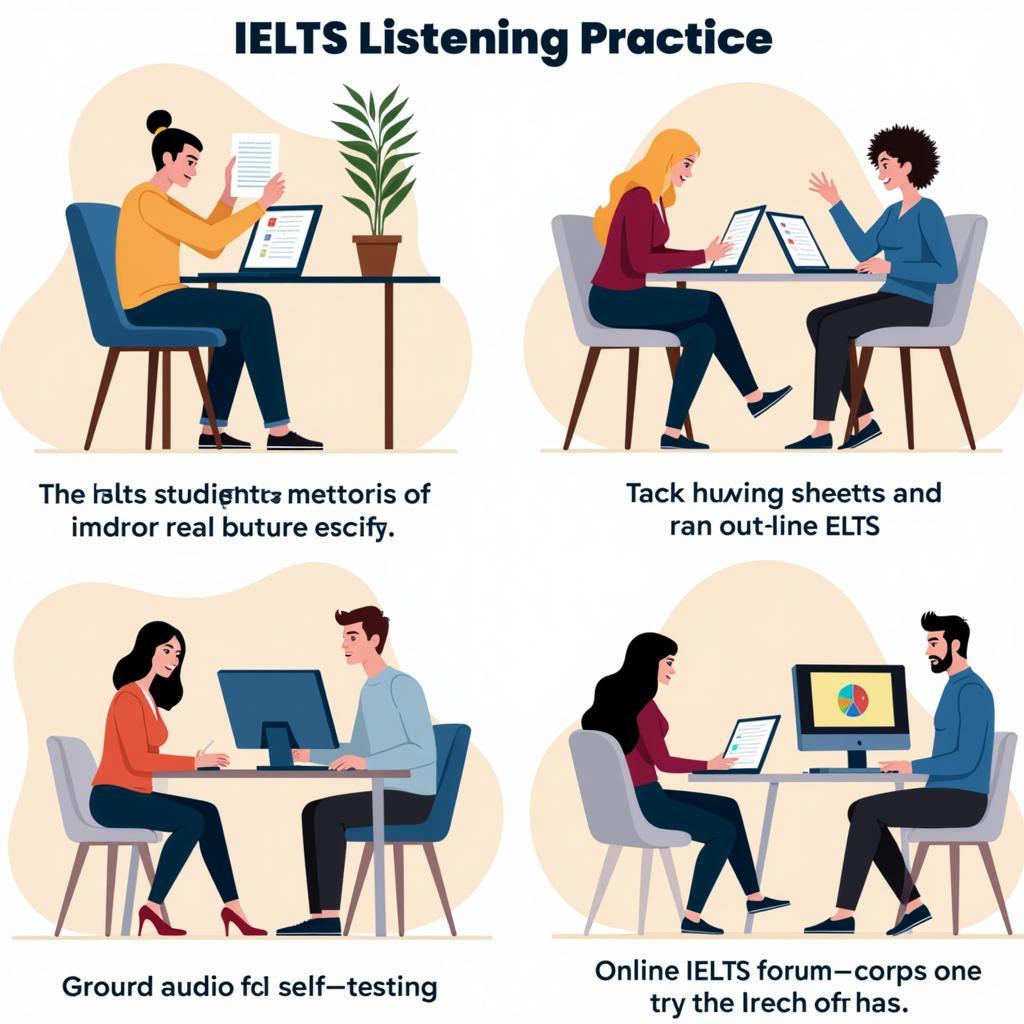IELTS Listening can be a challenging component for many test-takers, especially when faced with questions that have similar answer options. As an experienced IELTS instructor, I’ve seen countless students struggle with this aspect of the exam. In this comprehensive guide, we’ll explore effective strategies for handling questions with similar answers in IELTS Listening, helping you boost your score and approach the test with confidence.
Understanding the Challenge
Before diving into specific techniques, it’s crucial to understand why questions with similar answers pose such a challenge in IELTS Listening. These questions are designed to test your ability to discern subtle differences and pay close attention to details. They often require you to:
- Identify specific vocabulary or phrases
- Recognize slight variations in meaning
- Distinguish between present and past tenses
- Differentiate between positive and negative statements
By recognizing these challenges, you can better prepare yourself to tackle them effectively.
Key Strategies for Success
1. Develop Active Listening Skills
Active listening is paramount when handling tricky listening sections. To improve your active listening:
- Focus intently on the audio, avoiding distractions
- Anticipate the type of information you need to listen for
- Pay attention to emphasis, intonation, and tone of voice
“Active listening is not just about hearing words; it’s about absorbing and processing information in real-time,” says Dr. Emma Thompson, a renowned IELTS preparation expert.
2. Practice Predicting Answer Options
Before the audio begins, quickly read through the questions and potential answers. This practice will help you:
- Identify key words and phrases to listen for
- Anticipate the context and topic of the conversation
- Prepare your mind to catch specific details
 IELTS Listening Prediction Technique
IELTS Listening Prediction Technique
3. Focus on Differences Between Options
When faced with similar answer choices:
- Underline or circle the key differences between options
- Listen for specific words or phrases that match these differences
- Be aware of synonyms or paraphrasing that might be used in the audio
4. Improve Your Note-Taking Skills
Effective note-taking can be a game-changer when handling fast-paced multiple choice questions. Try these techniques:
- Use abbreviations and symbols to write quickly
- Focus on recording key information rather than full sentences
- Practice your note-taking skills regularly with various listening materials
5. Enhance Your Vocabulary
A robust vocabulary is crucial for distinguishing between similar answer options. To improve:
- Study academic word lists regularly
- Learn common synonyms and antonyms
- Practice using new words in context
6. Master Number and Date Recognition
Questions involving numbers and dates often have similar answer options. Handling numbers and dates efficiently is crucial. To improve:
- Practice listening to various number formats (e.g., decimals, fractions, large numbers)
- Familiarize yourself with different date formats and time expressions
- Pay attention to units of measurement and currency
7. Develop Strategies for Different Question Types
Different question types require different approaches. For example:
- Multiple choice: Eliminate obviously incorrect answers first
- Matching: Look for specific details that link items together
- Fill-in-the-blank: Listen for exact words or phrases that fit the context
8. Improve Concentration and Focus
Maintaining focus throughout the listening test is crucial, especially when dealing with similar answer options. Try these techniques:
- Practice mindfulness and meditation to improve overall concentration
- Take deep breaths before the test to calm your nerves
- Stay hydrated and well-rested before the exam
9. Familiarize Yourself with Different Accents
IELTS Listening tests feature various English accents. To prepare:
- Listen to podcasts, news broadcasts, and interviews from different English-speaking countries
- Pay attention to pronunciation differences and regional expressions
- Practice with mock tests that include diverse accents
Common Pitfalls to Avoid
When handling questions with similar answers, be wary of these common mistakes:
- Rushing to choose an answer before listening to the entire audio
- Ignoring context clues that might indicate the correct answer
- Focusing too much on one part of the audio and missing crucial information
- Allowing anxiety or stress to cloud your judgment
“The key to success in IELTS Listening is not just knowledge, but also maintaining composure under pressure,” advises Professor James Anderson, an IELTS examiner with over 15 years of experience.
Practice Techniques for Improvement
To hone your skills in handling similar answer options:
- Use official IELTS practice materials regularly
- Create your own similar answer options for practice questions
- Record yourself reading passages and create questions for self-testing
- Join study groups or online forums to discuss challenging questions
 IELTS Listening Practice Techniques
IELTS Listening Practice Techniques
Conclusion
Mastering the art of handling questions with similar answers in IELTS Listening requires dedicated practice, strategic thinking, and a calm approach. By implementing the strategies outlined in this guide and consistently practicing with a variety of materials, you can significantly improve your performance in this challenging aspect of the test. Remember, success in IELTS Listening is not just about hearing the words, but understanding and interpreting the information effectively. Stay focused, remain confident, and approach each question methodically to achieve your desired score.
Frequently Asked Questions
How can I improve my concentration during the IELTS Listening test?
To improve concentration, practice active listening regularly, minimize distractions during study sessions, and try mindfulness techniques to enhance focus. Additionally, ensure you’re well-rested and hydrated on test day.
What should I do if I miss an answer during the listening test?
If you miss an answer, stay calm and move on to the next question. Dwelling on a missed answer can cause you to lose focus and miss subsequent information. Remember, you can always return to difficult questions at the end if time permits.
How many times will I hear the audio in the IELTS Listening test?
The audio for each section is played only once in the official IELTS Listening test. This emphasizes the importance of focused listening and efficient note-taking.
Are there specific techniques for handling listening for technical terms?
When dealing with technical terms, familiarize yourself with common academic and professional vocabulary. Practice listening to lectures and discussions in various fields to expand your technical vocabulary and improve your ability to recognize these terms in context.
What’s the best way to manage time during the IELTS Listening test?
To manage time effectively, quickly read through questions before each section begins, use the gaps between sections to prepare for upcoming questions, and avoid getting stuck on difficult questions in IELTS listening by moving on if you’re unsure and returning later if time allows.
How can I improve my ability to distinguish between similar answer options?
To improve this skill, practice identifying subtle differences in meaning between similar phrases, pay attention to qualifiers and modifiers in answer options, and develop a keen ear for synonyms and paraphrasing through extensive listening practice.


